Top 6 B2B content marketing strategies to boost your business growth
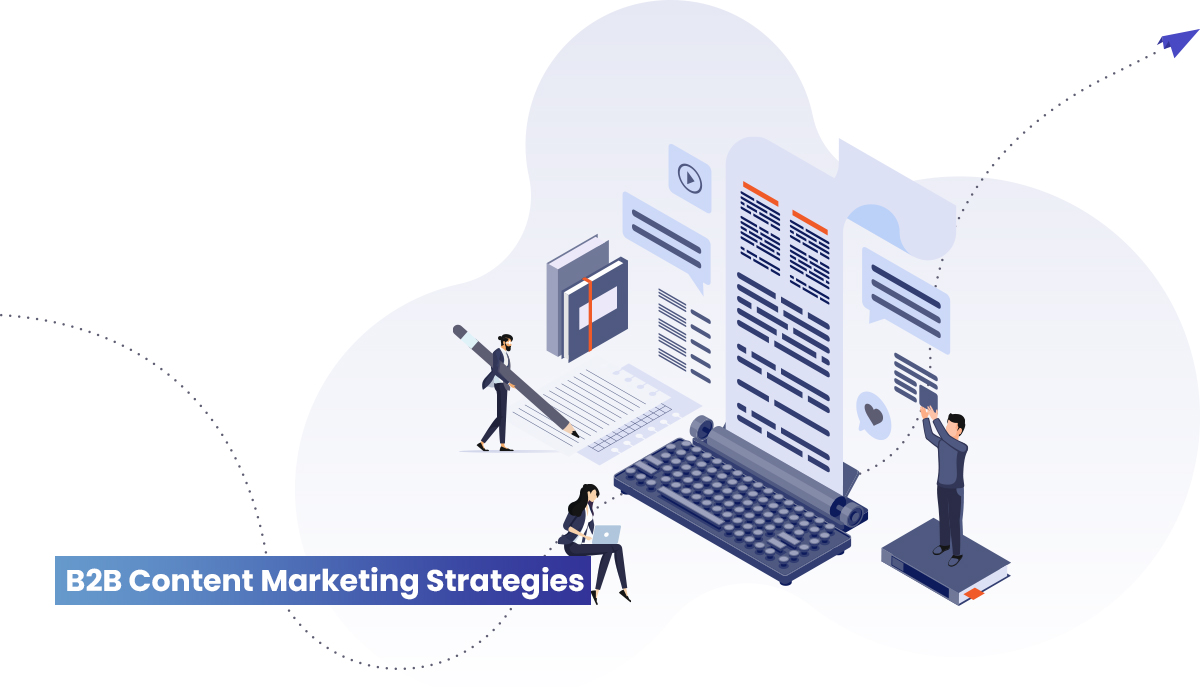
A clearly defined content strategy is the basis for all excellent content. However, businesses far too frequently skip the planning phases and dive right into content creation. Although this may temporarily produce some useful content, it frequently results in unfocused, untargeted, or irregularly published content that doesn't speak to your buyer personas.
Knowing the value of having a content strategy is one thing; knowing how to develop one is quite another. So, if you've ever wondered how to develop a content strategy for your company or what the most recent best practices for B2B content marketing are, we've got you covered. You can find all the advice you need to achieve your objectives for lead generation, customer acquisition, and client engagement in this blog post.
What is B2B Content Marketing?
The practice of creating and disseminating content with the goal of boosting brand recognition, traffic, leads, and sales for businesses-to-business organizations is known as B2B content marketing. Informational graphics, podcasts, email newsletters, and blogging are frequently used in B2B content marketing.
Why B2B content marketing is important?
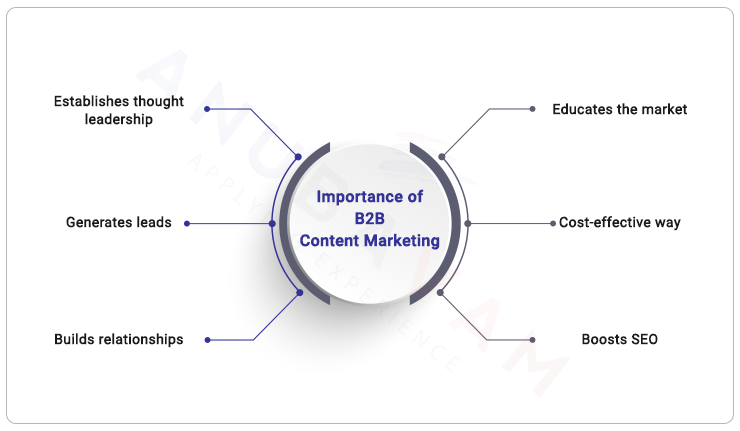
B2B (business-to-business) content marketing is important for several reasons including;
Establishing thought leadership: B2B content marketing can help a company establish itself as a thought leader in its industry, which can increase trust and credibility with potential customers.
Generating leads: By providing valuable information that addresses the needs and pain points of potential customers, B2B content marketing can generate leads and nurture them through the sales funnel.
Building relationships: B2B content marketing can help build long-term relationships with potential customers by providing them with valuable and relevant information over time.
Educating the market: B2B content marketing can educate the market about a company's products or services and how they can solve specific problems, which can increase demand and drive sales.
Cost-effective: B2B content marketing is a cost-effective way to reach a large number of potential customers, as it can be shared and distributed easily through digital channels such as email, social media, and websites.
Boosting SEO: By creating high-quality, informative content, a company can improve its search engine rankings, making it more visible to potential customers.
6 B2B content marketing strategies
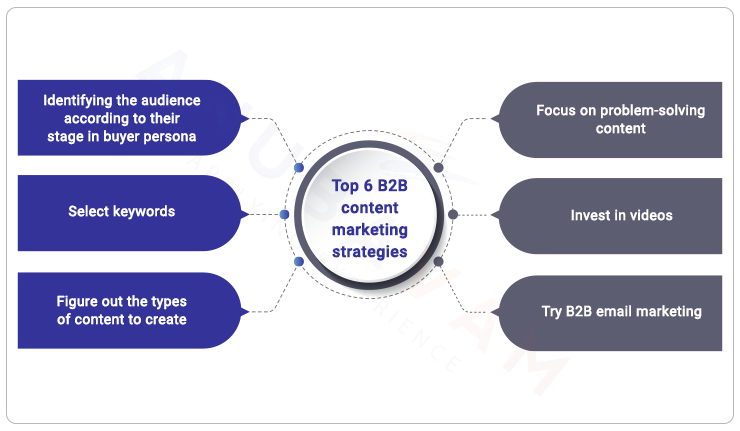
Marketing depends on its audience. While there are significant differences between B2B and B2C marketing, the pieces of B2B marketing material you'll use will undoubtedly also vary. They mostly depend on the journey the buyer is in, which includes the awareness stage, consideration stage, and decision stage.
The main justification for this is that every step may have an effect on your marketing plans. Additionally, it has to do with how you put your ideas into practice.
Six of the best content marketing strategies are discussed below:
1. Identify your audience and their requirements
Identifying your audience and their requirements based on buyer personas should be your first round of tasks when it comes to content marketing strategy. This way, you can create content that is more likely to resonate with your target audience and ultimately drive conversions.
If you were to ask what a buyer persona is, it is a semi-fictional representation of a company's ideal customer, based on market research and real data about existing customers. Identifying your audience and their requirements based on buyer persona is an important part of a content marketing strategy as it allows you to create content that is tailored to the specific requirements of your target audience.
Here are steps on how you can accomplish that:
Top-of-the-funnel or TOFU or Awareness Stage: Through blog posts, videos, and social media content, address the most urgent needs of your target audience. To initiate contact with your audience, you should perform better than your rivals in your organic and content outreach efforts.
Middle of the funnel or MOFU or Evaluation Stage: By offering case studies, product demos, webinars, in-depth research reports, and whitepapers, you can aid your potential customers in making the best choice as they weigh their options.
Bottom-of-the-funnel or BOFU or Decision Stage: Remind prospects about your offerings through drip email campaigns, free trials, discounts, and consultations as they narrow their search for a solution.
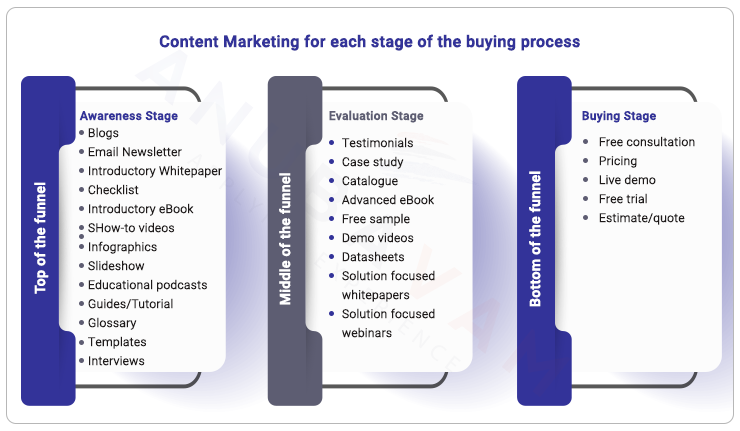
2. Select keywords
Keyword research is an important part of a content marketing strategy as it helps identify the terms and phrases that your target audience is searching for so that you can create content that is both relevant to users and search engine-friendly.
There are several types of keywords that can be used in a content marketing strategy, including long tail keywords, commercial keywords, and informational keywords. Here's how to identify them:
Long-tail keywords: Long-tail keywords are longer, more precise phrases that are less difficult to rank for and have lower levels of competition. They are often used to target niche or specific audiences. To identify long-tail keywords, you can use keyword research tools such as Google Keyword Planner, SEMrush, or Ahrefs.
Commercial keywords: Commercial keywords are terms that indicate a buying intent, such as "buy" or "purchase." These keywords are used to target audiences that are ready to make a purchase. To identify commercial keywords, you can use keyword research tools and look for terms that include words like "buy," "purchase," "order," or "price."
Informational keywords: Informational keywords are used to target audiences that are in the research phase of the buying process. These keywords are used to provide information and educate the audience about a specific topic or product. To identify informational keywords, you can use keyword research tools and look for terms that include words like "how," "what," "why," or "review."
Some other types of keywords are diagrammatically represented below;
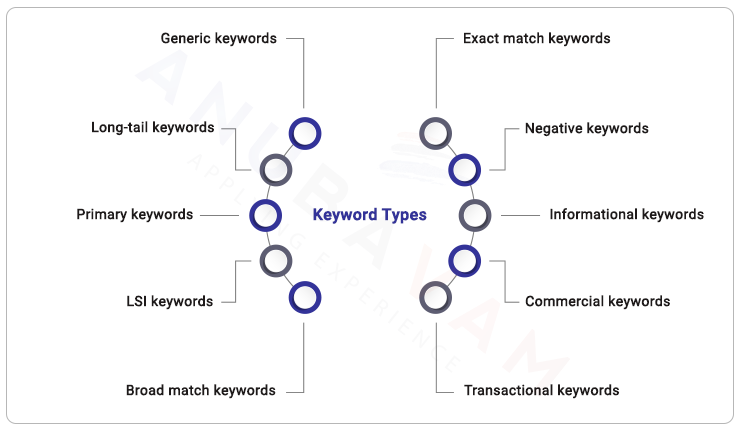
3. Figure out the types of content to create
It's critical to fully comprehend the various forms of content in order to use them efficiently for various campaigns and strengthen connections with audience segments. The reality is that different customers will have different preferences for content.
A 2018 Content Preferences Survey Report by Demand Gen found that depending on the stage of the customer journey a B2B buyer was in, their preferences for content varied greatly.
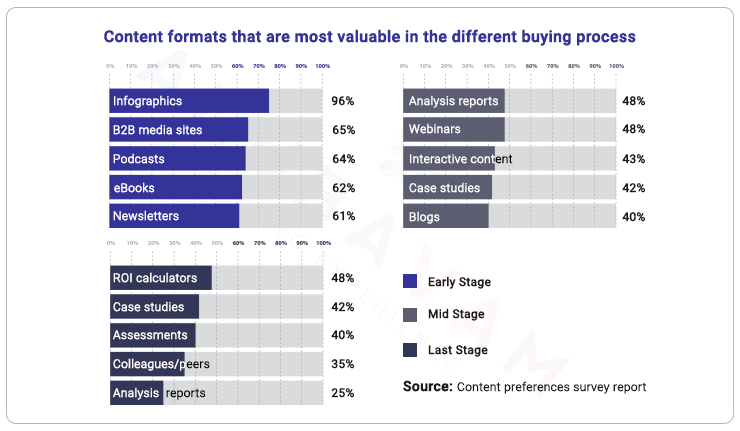
The same holds true for B2C customers. In order to meet their needs as they progress through the sales funnel, they frequently use various types of content.
It goes without saying that it is essential for your marketing team to understand which content strategies to apply in order to nurture each of your audience segments effectively.
The 10 essential types of Content Marketing are listed below;
- Blog posts
- Social media updates
- Case studies
- White papers
- E-books
- Infographics
- Webinars
- Videos
- Email newsletters
- Research reports
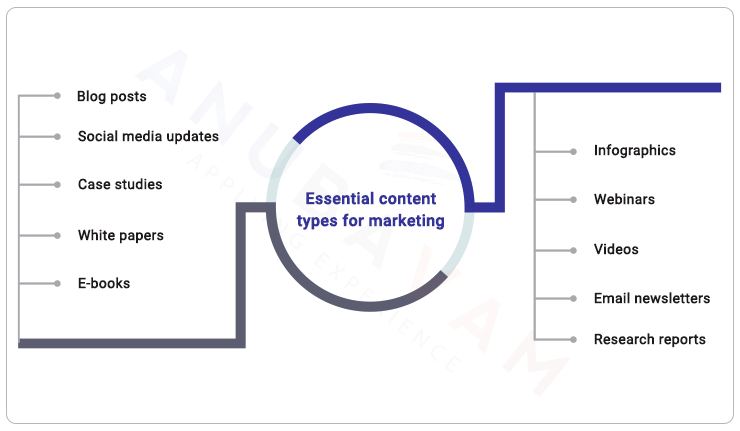
4. Focus on problem-solving content
By focusing on problem-solving content and funnel-based content, you can create value for your target audience and guide them through the buying process. This can help increase conversions and drive revenue for your business. Here are some steps to focus on problem-solving content and funnel-based content:
Identify customer pain points: Understand the problems and challenges your target audience is facing by conducting market research and creating buyer personas. Identifying their pain points will help you create problem-solving content that addresses their specific needs.
Offer solutions: Create content that offers solutions to the problems and challenges your target audience is facing. This can include blog posts, e-books, whitepapers, and webinars that offer practical advice and actionable tips.
Create a content funnel: Create a content funnel that guides your target audience through the different stages of the buying process. This can include top-of-the-funnel content, such as blog posts and infographics, that educate and raise awareness, middle-of-the-funnel content, such as e-books and webinars, that provide more in-depth information and build trust, and bottom-of-the-funnel content, such as case studies and product demos, that demonstrate the value of your products or services.
Measure and refine: Continuously measure the performance of your content and make adjustments as necessary. Use analytics tools to track engagement and conversion rates, and use that information to optimize and refine your content strategy.
5. Invest in video content
Investing in video content as part of a content marketing strategy can be a great way to engage and educate your target audience.
B2B marketers are using videos to create how-to, branded, explainers, influencer marketing, product reviews, event coverage, etc. Videos can be used to showcase products or services, demonstrate how to use them, or provide industry insights and thought leadership. They can also be used to build brand awareness and drive website traffic.
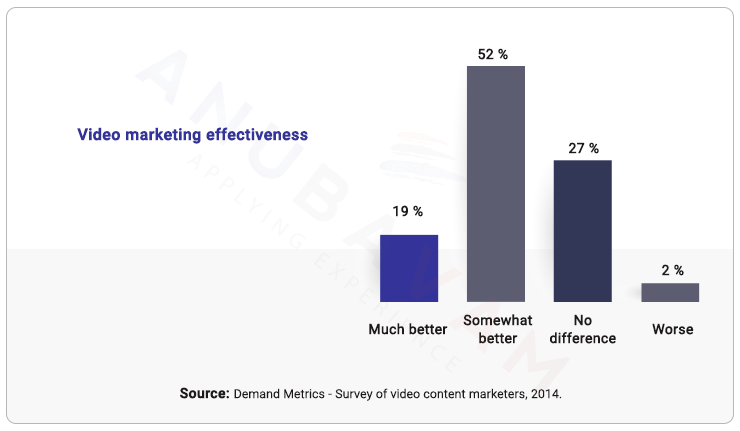
Video content can be distributed through a variety of channels, such as social media, YouTube, and your own website, and can also be embedded in blog posts, email newsletters, and other types of content.
Additionally, video can be used to create a more personal connection with your audience, and can be a great way to drive conversions. It is also a good idea to include subtitles or closed captions in the video, this helps to make your content more accessible to a wider audience, including those with hearing impairments or who are watching with the sound off.
6. Try B2B email marketing
Speaking of tried-and-true B2B marketing strategies, email marketing is a tool you can use to connect with corporate clients. Emails can convert subscribers into leads in addition to increasing engagement. And at that point, you have the chance to convert them into paying clients. Optimizing email marketing for conversions is essential, of course. Most importantly, you need to boost engagement and guarantee deliverability. But you also need to concentrate on expanding your email list.
You may be surprised to learn that 83% of B2B companies include email newsletters in their content marketing strategy. The following are some best practices for email marketing that you should be aware of:
- Make compelling subject lines
- Keep each email's call to action (CTA) to one
- Utilize email segmentation to connect with the right audience
- Ensure that the email designs you use are responsive
Best practices to follow for effective B2B Marketing
- Develop buyer personas to understand your target audience and tailor your content to their specific needs and pain points.
- Create a content calendar to plan and organize your content in advance.
- Utilize SEO to increase visibility and drive organic traffic to your website.
- Use social media to promote your content and engage with your audience.
- Create valuable, informative, and educational content to establish your company as a thought leader in your industry.
- To nurture leads and increase conversions, use email marketing.
- Create case studies and testimonials to showcase the success of your product or service.
- Create a variety of content formats, such as blogs, infographics, ebooks, and webinars, to appeal to different audiences.
- Collaborate with other companies and influencers in your industry to expand your reach.
- Measure and analyze your content's performance to continually improve and refine your strategy.
If you need help, contact us
We are a specialized content marketing company made up of Inbound Marketing experts who understand how to draw in, hold the attention of, and eventually, convert website visitors through interesting content.
We take the time to comprehend the key messages, business objectives, and buyer personas of our clients in order to develop B2B content marketing campaigns that drive leads and provide long-term value. In addition, we increase the reach of content by utilizing the best channels, depending on the needs of our clients, allowing us to target both current and potential audiences and guarantee that our clients' content is accessible anywhere, at any time. Talk to our experts now!
Related Articles
7 Advanced Account Based Marketing Strategies to Grow your business in 2023
87% of companies using B2B account-based marketing claim that it has a higher ROI than other marketing initiatives, according to research . There are many marketing options availab…
Read More →Subscribe to the Creatrix Blog
Fresh insights on higher education, straight to your inbox.
We respect your privacy.
Want to contribute?
We welcome thought leaders to share ideas and write for our blog.
Become a Guest Author →
